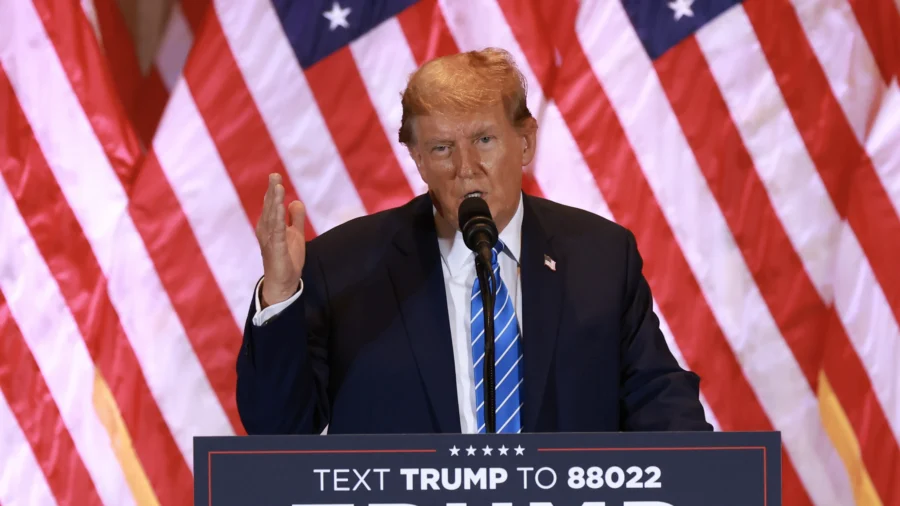Special counsel Jack Smith argued in a March 7 brief that former President Donald Trump has no presidential immunity to shield him in the case alleging he mishandled classified documents.
U.S. District Court Judge Aileen Cannon has set a March 14 hearing to hear arguments on President Trump’s several motions to dismiss, ahead of a Supreme Court hearing that may have some legal overlap.
President Trump argues that the absolute immunity conferred to a president covers all official acts—in this case designating his records “personal”—and he therefore cannot be criminally prosecuted for them.
Prosecutors argue the acts detailed in the indictment were not official acts, and that President Trump would lose presidential immunity after leaving office anyway.
Presidential immunity is not based on a Constitutional statute but rather a 1982 Supreme Court ruling, and the court has never addressed whether it extends to criminal prosecution.
But the issue is before the Supreme Court now as they have agreed to hear arguments in a second case Mr. Smith is prosecuting against President Trump for his actions on Jan. 6.
The Supreme Court has limited arguments to: “Whether and if so to what extent does a former President enjoy presidential immunity from criminal prosecution for conduct alleged to involve official acts during his tenure in office.”
This framing touches on similar issues attorneys for President Trump have raised in their motion to dismiss most of the charges in the documents case. President Trump was charged on 40 counts and presidential immunity applies to counts one through 32 defense attorneys argued.
If the judge agrees these were official acts, she may be inclined to await the Supreme Court’s decision before ruling on the motion to dismiss.
The Supreme Court has scheduled arguments for April 25. There is no set deadline for the court to release its decision, but the high court had expedited matters in another case brought by President Trump, finding states cannot disqualify him as a candidate under Section 3 of the 14th Amendment one day before the Super Tuesday primaries. That decision came out within a month of hearing oral arguments on Feb. 8.
Presidential Records
Prosecutors have also argued that the Presidential Records Act does not shield President Trump from charges in this case.
Defense attorneys argue that the act allows presidents to designate records as official or personal, and President Trump had designated the records in his possession as personal. This would have been an act of office, and therefore covered by presidential immunity, they further argued in a related motion to dismiss.
Prosecutors counter that President Trump lost the authority to have classified information when he left office, and all the charges are related to things he did after he left office. Former presidents can no longer claim presidential immunity, prosecutors added.
“That categorical claim of absolute immunity for a former President conflicts with constitutional text, separation-of-powers principles, history, and Supreme Court precedent,” the filing reads.
Prosecutors called the argument “frivolous” and claimed it was “offered for one transparent purpose—to delay the trial.”
Delay?
The presidential immunity issue has already put the other case Mr. Smith is prosecuting on hold, and prosecutors claimed that the defense knows this is a viable delay tactic.
“Trump’s immunity claim here is so wholly without merit that it is difficult to understand it except as part of a strategic effort for delay,” the filing reads.
“Non-frivolous immunity claims are typically subject to interlocutory review, and district court proceedings are stayed pending the resolution of the appeal. Trump knows all this.”
In the U.S. District Court for the District of Columbia, the other case has been on hold since last December, when a federal judge rejected President Trump’s motion to dismiss the case based on presidential immunity.
Though the appeal of this motion stalled case proceedings, higher courts have accepted the appeal at breakneck speed.
An appeals court accepted the case and agreed to expedite it within days of a notice of appeal, requesting opening briefs within a week. Oral argument was scheduled for less than a month later, and then a decision was handed down less than a month after the hearing.
In an atypical move, the appeals court also expedited President Trump’s path to the Supreme Court, requiring him to file an appeal with the high court less than a week after the appeal’s court rejection of his argument. The appeals court panel decided that a petition for rehearing in the appeals court would not result in a continued stay of case proceedings, something normally available to appellants.
The Supreme Court, too, fast-tracked the case. Instead of granting the stay President Trump requested, it granted the special counsel’s request to treat the application for a stay as a petition for review, and scheduled a late April hearing.
Experts are split on whether the turn of events has been a win for President Trump or the special counsel, noting that prosecutors clearly want to bring a case before the general election while President Trump’s attorneys have said they would like to push it beyond November.
Andrew Weissmann, former FBI general counsel, told MSNBC there was “no way somebody like Jack Smith” isn’t “thinking through how to get this case through to trial before the general election.”
Scott Lemieux, a professor of political science at the University of Washington, told Business Insider that even if the High Court rejects the immunity defense, President Trump “fundamentally still wins because he manages to avoid a trial before the election.”
From The Epoch Times


